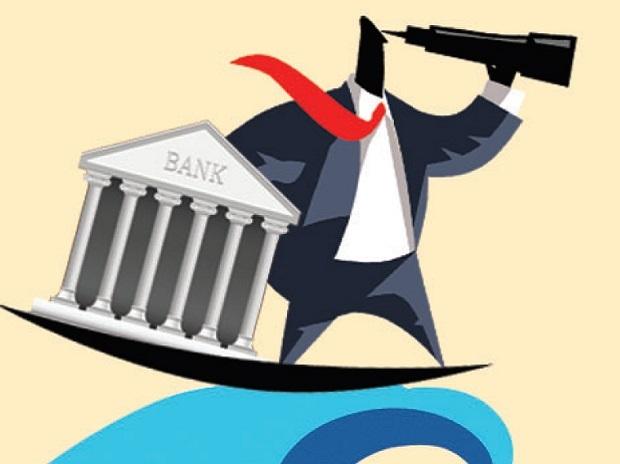Nifty Bank index hits over 1-month low; Bandhan, RBL Bank slip 5%
At 12:51 pm, the Nifty Bank index was down 2.7 per cent at 34,536 points, as compared to 1.6 per cent decline in the Nifty50 index
Topics
Nifty Bank index | Buzzing stocks | Markets
SI Reporter |
Last Updated at March 15, 2021 13:16 IST
Shares of financials, including banks, were under pressure on Monday, with the Nifty Bank index, down 3 per cent, hitting an over one-month low after the Consumer Price Index (CPI) inflation hit a three-month high in February 2021, while Index of Industrial Production (IIP) recorded a contraction of 1.6 per cent in January.
The pick-up in CPI inflation and the fall in IIP does not make the Monetary Policy Committee’s (MPC) task any easier. While we hope that IIP would return to positive territory in February, we expect inflation to edge up further to around 5.4 per cent in March. Accordingly, we expect the MPC to maintain status quo at its Apr’21 policy meeting, the Motilal Oswal Securities said in a note.
At 12:51 pm, Nifty Bank index was down 2.7 per cent at 34,536 points, as compared to 1.6 per cent decline in the Nifty50 index. The Nifty Bank index hit an intra-day low of 34,443.90, its lowest level since February 4, 2021. Nifty Private Bank and Nifty PSU Bank indices were fallen 2.8 per cent and 2.1 per cent, respectively.
Among the individual stocks, Bandhan Bank and RBL Bank slipped 5 per cent each, while, IDFC First Bank, Federal Bank, Axis Bank, ICICI Bank, Punjab National Bank and State Bank of India were trading lower in the range of 3 per cent to 4 per cent on the NSE.
Analysts at Motilal Oswal Securities expect CPI inflation to inch further above to around 5.4 per cent in March 2021. If so, we do not expect the MPC to cut policy rates or even change its stance at its April meeting, which would be its first in FY22. With actual IIP numbers indicating a growth of 4.8 per cent (from 4.9 per cent earlier), which is not a major change. We continue to expect real GDP between 3 per cent and 4 per cent YoY in 4QFY21, the brokerage firm said.
“Prices pressures are likely to prevail in the coming months given the rise in global prices across commodities and the rise in food prices. Also, the non-food and non-fuel (core inflation) is likely to remain at elevated levels. The rise in inflation could come in the way of economic recovery and can pose a challenge to the RBI in maintaining an accommodative policy stance. We do not foresee a rate cut by the RBI in the forthcoming monetary policy meet,” CARE Ratings said post February retail inflation numbers.
 Dear Reader,
Dear Reader,
Business Standard has always strived hard to provide up-to-date information and commentary on developments that are of interest to you and have wider political and economic implications for the country and the world. Your encouragement and constant feedback on how to improve our offering have only made our resolve and commitment to these ideals stronger. Even during these difficult times arising out of Covid-19, we continue to remain committed to keeping you informed and updated with credible news, authoritative views and incisive commentary on topical issues of relevance.
We, however, have a request.
As we battle the economic impact of the pandemic, we need your support even more, so that we can continue to offer you more quality content. Our subscription model has seen an encouraging response from many of you, who have subscribed to our online content. More subscription to our online content can only help us achieve the goals of offering you even better and more relevant content. We believe in free, fair and credible journalism. Your support through more subscriptions can help us practise the journalism to which we are committed.
Support quality journalism and subscribe to Business Standard.
Digital Editor

